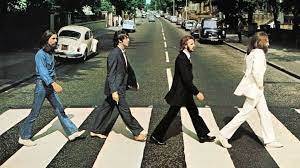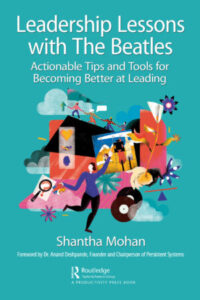
Shantha Mohan, a global technical leader, entrepreneur, and three-time author, talks to us about her latest book, Leadership Lessons With The Beatles (Routledge). Mohan notes how leadership has gone through different changes and how it has transformed beyond the thought that it is about control and power.
She details skills and tools needed to ensure effective leadership in which traditional roles must acknowledge tried-and-tested rules can no longer be enough and the need to go beyond. This is delivered through the creative approach she applies via songs and lyrics from The Beatles - a unique approach through which the lesson she teaches is communicated in a relatable manner.
Fun facts about the songs along with real life case studies come together to create an incredible book causing one to dig deep and think how such tools can be applied in one's own life.
A couple of reasons. My leadership journey prompted me to write this book, and I talk about them throughout the book, but I also bring the wisdom from thought leaders and practitioners. So the book is not just about Shantha’s experience. Second, I draw my inspiration from the music of The Beatles, and I wanted to give the readers a mantra for each chapter. Studies have shown that when you associate a mantra with anything you do, it reinforces the thinking. What better than the titles of the Beatles songs to do that? Then there is the aspect of standing out in the world of leadership books. I wanted a hook that was unique to my book.

I do see what you did there!
I was thinking about most of my audience—those who might have just transitioned from individual contributors to team leaders. I was also thinking about good content, which should motivate the reader to lead better and provide the “How.” As an engineer, my mind is always focused on how and the tools to problem-solve. That is why I brought the why and how together. Each chapter gives the reader the motivation—why should you care?” and follows up with the how—practice and questions to reflect on.
Great question! If only all businesses were just about enhancing the quality of life! We, humans, are complex beings. And each of us is unique. What is good for me could be considered bad for someone else. There are, of course, universally bad businesses. As individuals, we can work on promoting universal good and speak up when we see bad practices. We can make our daily life about not negatively impacting our actions and activities. As I mention in the chapter, I believe in the Serenity Prayer— “God, grant me the serenity to accept the things I cannot change, courage to change the things I can, and wisdom to know the difference.” We must be aware that some things are under our control, and some are not. Don’t let those not under our control affect our feelings of positivity.
I did quite a bit of research and came up with stories supporting my viewpoint. Elon Musk has flaws, just like all human beings, but I admire his tenacity, so his story was very appropriate to include in that chapter.
It is insightful that you connected those two chapters, and you asked a challenging question. One doesn’t need to worry about a team member overshadowing us. This is where confidence in ourselves and self-awareness come in. If you see a team member who shows excellent evidence that they could be better than you, it is your duty as a leader to let that person shine. As I say in the chapter “I Me Mine,” “The ultimate empowerment is the new leader who can carry on what you, as a leader, used to do. Perhaps now, they can go beyond what you were capable of as a leader. That would be your proudest moment.” There is a little bit of selfishness in doing this. You cannot hope to advance without grooming someone to take over from you. If there is no place for you in the organization because of this, other avenues will open up.

Intuition is not something that is well understood. However, there are many stories from businesses where the leaders speak up about how intuition guided their decision-making. Communicating why someone should trust your intuition is difficult in any situation, professional or personal. Decision-making should always consider the insights available from available data. One clear case of using intuition is when you have no data. In that case, you use your gut feelings but are prepared to change your course if you see any evidence that you may be on the wrong track.
I believe that education must include the teaching of emotional intelligence, the first component of which is self-awareness. Many universities recognise this and are offering programs in emotional intelligence. Coursera, the online education platform, lists many courses, such as the University of Michigan’s “Emotional Intelligence: Cultivating Immensely Human Interactions .” Universities like Yale have a Center for Emotional Intelligence. Harvard offers a course on “Emotional Intelligence in Leadership,” in their continuing education program. We are seeing businesses embracing a new way of leadership that combines heart and mind, and we see many CEOs exhibiting this. I would say that teaching emotional intelligence should start with primary school children. I have seen some evidence of this.
She details skills and tools needed to ensure effective leadership in which traditional roles must acknowledge tried-and-tested rules can no longer be enough and the need to go beyond. This is delivered through the creative approach she applies via songs and lyrics from The Beatles - a unique approach through which the lesson she teaches is communicated in a relatable manner.
Fun facts about the songs along with real life case studies come together to create an incredible book causing one to dig deep and think how such tools can be applied in one's own life.
- In your introduction you talk about how you enhanced your leadership skills by working and training teams – a lot of interpersonal relationships and communication. Why did you not draw from your own experiences instead of applying the Beatles songs?
A couple of reasons. My leadership journey prompted me to write this book, and I talk about them throughout the book, but I also bring the wisdom from thought leaders and practitioners. So the book is not just about Shantha’s experience. Second, I draw my inspiration from the music of The Beatles, and I wanted to give the readers a mantra for each chapter. Studies have shown that when you associate a mantra with anything you do, it reinforces the thinking. What better than the titles of the Beatles songs to do that? Then there is the aspect of standing out in the world of leadership books. I wanted a hook that was unique to my book.

- It’s interesting how you say some Beatles songs are timeless as are some leadership principles. But then there is also the engineer in you and you offer what you term ‘tools’ in your book. How did you merge the leader and engineer in you? Did you structure the book in two different ways and hope it all comes together (see what I did there)?
I do see what you did there!
I was thinking about most of my audience—those who might have just transitioned from individual contributors to team leaders. I was also thinking about good content, which should motivate the reader to lead better and provide the “How.” As an engineer, my mind is always focused on how and the tools to problem-solve. That is why I brought the why and how together. Each chapter gives the reader the motivation—why should you care?” and follows up with the how—practice and questions to reflect on.
- Getting better – you are an eternal optimist. In my lifetime I’ve seen two economic downturns, one pandemic and one unbelievable climate change impact. The whole idea behind business (which encompasses leadership and management) is to sell a product or an idea to enhance the quality of life. How do you feel optimistic when we are seeing the negative impacts of economic activity?
Great question! If only all businesses were just about enhancing the quality of life! We, humans, are complex beings. And each of us is unique. What is good for me could be considered bad for someone else. There are, of course, universally bad businesses. As individuals, we can work on promoting universal good and speak up when we see bad practices. We can make our daily life about not negatively impacting our actions and activities. As I mention in the chapter, I believe in the Serenity Prayer— “God, grant me the serenity to accept the things I cannot change, courage to change the things I can, and wisdom to know the difference.” We must be aware that some things are under our control, and some are not. Don’t let those not under our control affect our feelings of positivity.
- What I find most interesting is how you weave in case studies that are applicable to the relevant chapter title. For example, The Long And Winding Road and Elon Musk! I mean it’s just wild how you did that. It’s almost as if you wrote the book free from boundaries and inhibitions. What was the thought process behind this?
I did quite a bit of research and came up with stories supporting my viewpoint. Elon Musk has flaws, just like all human beings, but I admire his tenacity, so his story was very appropriate to include in that chapter.
- My favourite was We Can Work It Out and the Kennedy quote was the cherry on top. The lesson you outline in this chapter is further broken down in the chapter 10 (I, Me, Mine). The idea that one has to break free from the ‘me,me,me’ mentality to create success is not always what is seen in business where it is about ‘what is in it for me?’ How easy is it realistically to empower team members without letting them overshadow one as a leader?
It is insightful that you connected those two chapters, and you asked a challenging question. One doesn’t need to worry about a team member overshadowing us. This is where confidence in ourselves and self-awareness come in. If you see a team member who shows excellent evidence that they could be better than you, it is your duty as a leader to let that person shine. As I say in the chapter “I Me Mine,” “The ultimate empowerment is the new leader who can carry on what you, as a leader, used to do. Perhaps now, they can go beyond what you were capable of as a leader. That would be your proudest moment.” There is a little bit of selfishness in doing this. You cannot hope to advance without grooming someone to take over from you. If there is no place for you in the organization because of this, other avenues will open up.

- The chapter titled ‘I’ve got a Feeling’ just had me on cloud 9. Spirituality is something that I personally hold very dear but it isn’t easy to communicate that in a professional environment where the stakes are high. What would you recommend one do then?
Intuition is not something that is well understood. However, there are many stories from businesses where the leaders speak up about how intuition guided their decision-making. Communicating why someone should trust your intuition is difficult in any situation, professional or personal. Decision-making should always consider the insights available from available data. One clear case of using intuition is when you have no data. In that case, you use your gut feelings but are prepared to change your course if you see any evidence that you may be on the wrong track.
- You explore the Self further in ‘Let It Be’. Self awareness is something you examine thoroughly and link it to stress management. Do you think universities and organisations should offer courses on self awareness as a means of generating better leaders? Or is there the fear that this will actually collide with existing business models and hamper financial success?
I believe that education must include the teaching of emotional intelligence, the first component of which is self-awareness. Many universities recognise this and are offering programs in emotional intelligence. Coursera, the online education platform, lists many courses, such as the University of Michigan’s “Emotional Intelligence: Cultivating Immensely Human Interactions .” Universities like Yale have a Center for Emotional Intelligence. Harvard offers a course on “Emotional Intelligence in Leadership,” in their continuing education program. We are seeing businesses embracing a new way of leadership that combines heart and mind, and we see many CEOs exhibiting this. I would say that teaching emotional intelligence should start with primary school children. I have seen some evidence of this.

